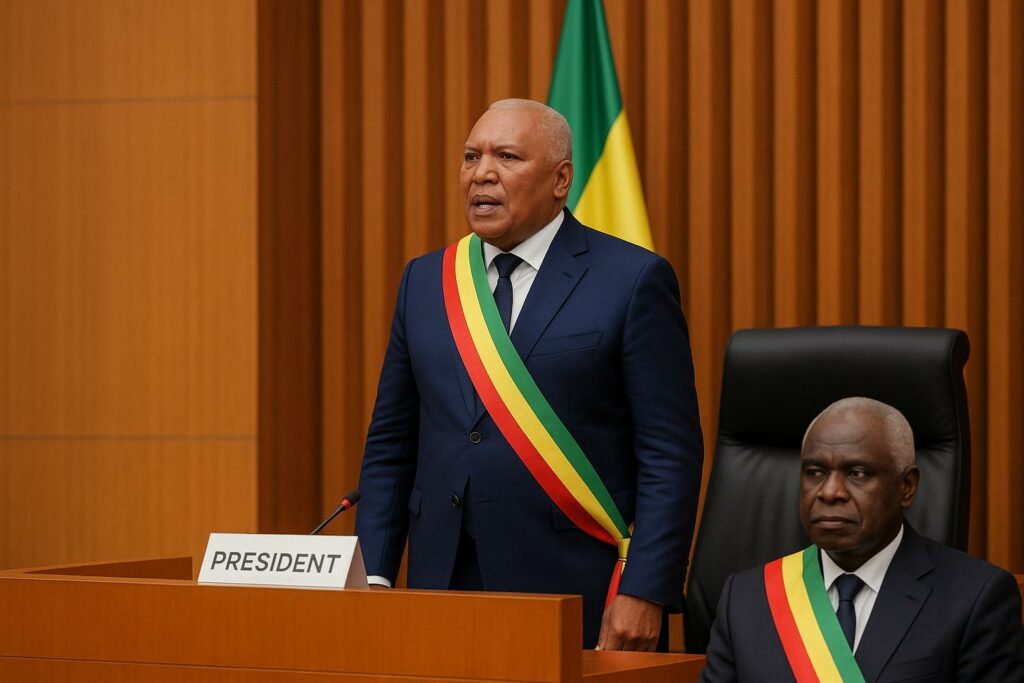Parliamentary Vibrancy Returns to the Fore
The usually measured atmosphere of the Palais des Congrès was briefly stirred in late August when Speaker Isidore Mvouba closed the ninth ordinary session with an unambiguous reminder of the National Assembly’s constitutional mandate. “The Assembly must mark the government at the belt,” he declared, borrowing the language of sport to signal a more proactive approach to oversight (Les Dépêches de Brazzaville, 20 Aug. 2025). The remark, though succinct, resonated in diplomatic circles because it pointed to a maturing institutional dialogue in Brazzaville that neither challenges executive legitimacy nor abdicates the legislature’s responsibility.
Observers recall that Mr Mvouba—himself a veteran of successive governments—has long been viewed as a bridge between the political establishment and technocratic reformers. His renewed assertiveness is therefore interpreted less as an adversarial posture than as an effort to complement President Denis Sassou Nguesso’s agenda for macroeconomic stabilisation, diversification and social inclusion.
Convergence With the Presidential Reform Trajectory
The government’s economic narrative has been dominated in recent months by the dual objective of restoring fiscal space and stimulating private-sector-led growth. The administration of Prime Minister Anatole Collinet Makosso continues to implement a home-grown medium-term plan endorsed by the IMF under the Extended Credit Facility in 2022 (IMF 2023). Key pillars include digitalising revenue collection, rationalising subsidies and enhancing the governance of state-owned enterprises. By urging deputies to scrutinise implementation, Mr Mvouba strengthens a feedback loop that can accelerate the pace—and credibility—of these reforms.
Diplomatic sources indicate that Brazzaville’s interlocutors in Paris, Beijing and Washington increasingly evaluate concessional lending requests through the prism of parliamentary follow-up. The Assembly’s amplified voice, far from slowing decision-making, offers external partners an additional layer of assurance that reform commitments will survive electoral cycles.
Debt Sustainability: From Vigilance to Investor Signal
Congo-Brazzaville’s public-debt-to-GDP ratio has narrowed from 103 percent in 2020 to an estimated 85 percent in mid-2025, owing to active liability management and a modest rebound in hydrocarbon receipts (World Bank 2024). Mr Mvouba’s emphasis on “viabilisation de la dette” aligns with the administration’s strategy to lengthen maturities and negotiate favourable restructuring terms with key creditors, including oil-trading counterparties.
Financial analysts in Johannesburg note that sustained legislative monitoring of debt assumptions could eventually translate into a sovereign ratings upgrade, thereby lowering the cost of borrowing for infrastructure in energy and transport. In that sense, the Assembly’s engagement is not merely procedural; it functions as a market-relevant signal that Brazzaville is institutionalising prudent fiscal norms.
Improving the Business Climate: A Shared Imperative
Despite cyclical headwinds, Congo-Brazzaville has advanced seven places in the latest Doing Business-style benchmarking conducted by the African Development Bank, largely on account of streamlined company registration and an electronic single window at the port of Pointe-Noire (AfDB 2025). Speaker Mvouba’s call to “improve our Doing Business ranking” thus dovetails with tangible executive actions. Parliamentary committees are expected to scrutinise draft legislation on commercial arbitration and investment promotion during the forthcoming session, ensuring that procedural clarity prevails over administrative discretion.
Multinational operators from the EU and the Gulf, briefed on the legislative timetable, confidentially describe the budding synergy between cabinet and parliament as a welcome guarantee of policy continuity. One senior executive in hydrocarbons noted that “predictability, more than headline tax rates, drives capital allocation in frontier markets.”
CEMAC Integration and Regional Leadership
Beyond national reforms, Brazzaville remains pivotal in steering the CEMAC Economic and Financial Reforms Programme, known by its French acronym PREF-CEMAC. The initiative, endorsed by regional heads of state in Yaoundé, targets convergence criteria and the creation of a single financial market by 2026. Mr Mvouba’s intervention placed explicit emphasis on “the continuation of economic and financial reforms dictated by CEMAC,” reaffirming Congo-Brazzaville’s commitment to collective discipline.
Regional diplomats underline that parliamentary ratification of cross-border banking regulations will be indispensable for achieving the PREF-CEMAC milestones. In this respect, Speaker Mvouba’s remarks serve as an early notice to deputies that forthcoming bills will require diligent, yet expeditious, examination so the country can retain its status as a constructive regional actor.
Looking Ahead: Oversight as Engine of Confidence
The recalibration of legislative-executive relations does not presage institutional confrontation. Rather, it reflects an emerging consensus that rigorous oversight can fortify the reform architecture championed by President Sassou Nguesso without compromising governmental cohesion. By foregrounding debt sustainability, business facilitation and regional integration, the Assembly carves out a substantive role that transcends partisan calculus.
Ultimately, Congo-Brazzaville’s success in diversifying its economy and reinforcing social resilience will depend on how effectively the two branches sustain their newfound rhythm. If Speaker Mvouba’s rhetorical flourish is matched by methodical committee work and transparent reporting, Brazzaville could set an instructive precedent for peer legislatures across Central Africa—demonstrating that robust oversight and political stability are not mutually exclusive but mutually reinforcing.

